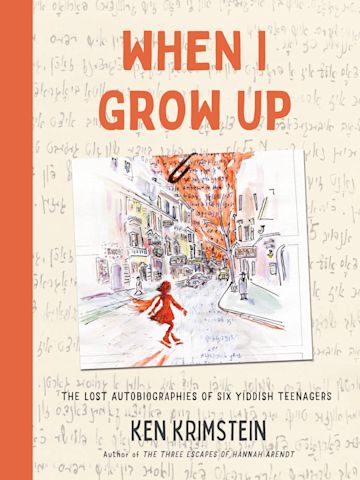 When I Grow Up: The Lost Autobiographies of Six Yiddish Teenagers by Ken Krimstein is a collection of “lost autobiographies” that breaks with many norms readers might expect from autobiographical works. And I predict YA literature readers will be fascinated by the power of these young people’s words and experiences and the “author’s” visual interpretation of their memoirs.
When I Grow Up: The Lost Autobiographies of Six Yiddish Teenagers by Ken Krimstein is a collection of “lost autobiographies” that breaks with many norms readers might expect from autobiographical works. And I predict YA literature readers will be fascinated by the power of these young people’s words and experiences and the “author’s” visual interpretation of their memoirs.
The Back Story
The book’s “Preface: Crossing the Abyss” and “The Before” detail the 80-year journey of these stories. Throughout the 1930s, the Yidisher Visnshaftlekher Institut (YIVO), a Yiddish cultural organization, ran an essay writing contest for teenagers. The teens’ memoirs were to answer the question: “How can one live as a Jew?” On the very day the contest winner was to be announced, September 1, 1939, the Nazis invaded Poland and the award was never given.
A few years later, the Nazis asked forty librarians, the “Paper Brigade,” to sort through YIVO’s collection. In the process, they hid many of YIVO’s documents, including these teens’ anonymous contest entries. When the Soviets recaptured Vilna, the Paper Brigade opened the Vilna Jewish Museum and archived the YIVO collection. Then when Stalin ordered the contents of the museum burned, Antanas Ulpis, a non-Jewish librarian, risked his life to hide YIVO documents–this time in a church organ and confessional. In 2017, the documents, including the essays, were discovered when the church was finally cleaned out.
In 2018, the “author” Ken Krimstein, a New Yorker cartoonist, visited the Martynas Mažvydas National Library of Lithuania. An archivist shared with him an 80-year-old notebook with writings by a “Yiddishuania” young adult. (“Yiddishuania” is the term Krimstein uses to situate Yiddish-speaking people of Lithuania and Poland in the 1930s.) The survival of these texts whose authors Krimstein assumed did not have the chance to grow up was astounding. Since he understood the power of the graphic narrative to speak to young adults, Krimstein used his talent for cartooning to illustrate their stories.
The Memoirs
When I Grow Up includes six essays. The writers of each essay share their unique hopes and dreams for the future. Cultural, religious and political threads run through the stories as well as the young people’s emotions related to issues with their families and friends. Krimstein includes footnotes to define Yiddish terms and clarify other references in the autobiographies.
“The Rule Breaker” memoir written by an 11 1/2-year-old girl was particularly intriguing to me. She broke three contest rules; she was too young, included a photo and signed her entry. Her name was Beba Epstein. In the essay titled “The Boy Who Liked a Girl,” a 20-year-old boy wrote that he entered the contest because he could only share his thoughts with the trees and could not talk about his suffering with his friends. “Great is my suffering Poor are my thoughts No hand and no thought can you find here But I want to ask something of You Don’t put this aside Publish it for me” (180).
Krimstein interpreted these texts through his art. His cartoons increase the impact of the essays by adding context, emotion and action to the writers’ words. Rendered as black line pencil sketches with orange-wash accents, readers will be drawn into the stories through the graphics.
The After
After a story about the memoirs was published in the New York Times, the son of the “The Rule Breaker” phoned an editor to let him know his mother was Beba Epstein. Krimstein later learned through The Book Smugglers by David E. Fishman that Beba Epstein had been a member of the “Paper Brigade.” “The After” ends with a photograph of Beba with her grandchildren.
Miraculously these memoirs were preserved, and thankfully discovered, illustrated and published. The result in an illuminating and thought-provoking experience for readers of Shoah literature. -Recommended by Judi Moreillon, Literacies and Libraries Consultant, Tucson, Arizona
Title: When I Grow Up: The Lost Autobiographies of Six Yiddish Teenagers
Author: Ken Krimstein
ISBN: 9781635573701
Publisher: Bloomsbury
PubDate: November 16, 2021
Each month a committee of Worlds of Words advisors recommends a book published within the last year. Our hope is to spark conversations on our website and on social media about the book that expand global understandings and perceptions. Please join us by leaving a comment. You can also share your thoughts with us by using the hashtag #WOWRecommends on social media. See our full list of WOW Recommends in the archives.
- Themes: Judi Moreillon, Ken Krimstein, When I Grow Up
- Descriptors: WOW Recommends
